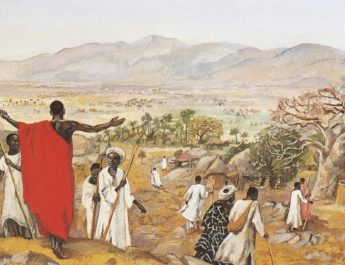Galatians 5:1, 13-25
Ordinary C31
1 For freedomI ChristII has set us free.III
I “freedom” = eleutheria. 11x in NT. From eleutheros (a free person, at liberty, not a slave; properly, unshackled – figuratively, it is one who has the freedom to choose their destiny. Also, it is one who does not have obligation or liability); probably from erchomai (to come or go). This is liberty or freedom. Particularly, it would be release from slavery. It can also refer to moral freedom.
II “Christ” = Christos. From chrio (consecrate by anointing with oil; often done for prophets, priests, or kings). Literally, the anointed one, Christ. The Greek word for Messiah.
III “set…free” = eleutheroo. Related to “freedom” in v1. 7x in NT. From eleutheros (see note I above). This is to liberate, set free, release from bondage. It can mean to clear someone from liability. Figuratively, it is freeing someone from bondage to sin.
Stand firm,IV therefore, and do not submitV again to a yokeVI of slavery.VII
IV “stand firm” = steko. 11x in NT. From histemi (to stand, place, establish, appoint, stand ready, be steadfast). This is to stand fast or be stationary. Figuratively, it can mean to persevere.
V “submit” = enecho. 3x in NT. From en (in, on, at, by, with) + echo (to have, hold, possess). This is to ensnare, to hold onto anger, to subject, to be hostile, to submit.
VI “yoke” = zugos. From zeugnumi (to yoke). This is a yoke or set of scale. It is what unites people in shared work so it is servitude or obligation.
VII “slavery” = douleia. 5x in NT. From douleuo (to be a slave, be in bondage, to serve, obey, be devoted; it is to be a slave in a literal or figurative sense); from doulos (a servant or for a slave, enslaved; someone who belongs to someone else; could be voluntary (choosing to be enslaved to pay off debt) or involuntary (captured in war and enslaved)); from deo (to tie, bind, fasten, impel, compel; to declare something against the law or prohibited). This is slavery, bondage, or enslavement in a literal or figurative sense.
13 For you were calledVIII to freedom, brothersIX and sisters, onlyX do not use your freedom
VIII “called” = kaleo. Related to keleuo (to command, order, direct); from kelomai (to urge on). This is to call by name, invite, to name, bid, summon, call aloud.
IX “brothers” = adelphos. From a (with, community, fellowship) + delphus (womb). This is a brother in a literal or figurative sense. It is also used of another member of the Church.
X “only” = monon. From monos (alone, single, remaining, mere, desolate); from meno (to stay, abide, wait, endure). This is merely, only, simply, sole. It can also imply alone.
as an opportunityXI for self-indulgence,XII but through loveXIII become enslavedXIV to one another.
XI “opportunity” = aphorme. 7x in NT. From apo (from, away from) + hormao (to rush, run, start, or spur on); {from horme (onrush, quick motion forward, attempt, inclination, attempt)}. This is occasion, launching point, opportunity.
XII “self-indulgence” = sarx. May be from saroo (to sweep, cleanse by sweeping); from sairo (to brush off). This is flesh, the body, human nature, materiality, kindred. Flesh is not always evil in scripture (as when it refers to Jesus taking on a human body). However, it is generally used in a negative way for actions made selfishly and not through faith. This can mean animal flesh, i.e. meat, or refer to body in contrast to soul/spirit. Flesh can be a way of talking about how things or people are related or talking about human frailty (physical or moral).
XIII “love” = agape. From agapao (to love, take pleasure in, esteem; to prefer). This is love, goodwill, benevolence. It is God’s divine love or human love that mirrors God’s love.
XIV “become enslaved” = douleuo. Related to “slavery” in v1. See note VII above.
14 For the wholeXV lawXVI is summed upXVII
XV “whole” = pas. This is all or every.
XVI “law” = nomos. From nemo (to parcel out). Literally, this is that which is assigned. It can be usage, custom, or law. This word can be used for human or divine law. It can be used specifically for the law of Moses or as a name for the Torah (the first five books of the Bible). Sometimes it is used for scripture as a whole, of the Gospel, or of any theology. It is also used for the “tradition of the elders,” which would be the oral Torah – the tradition of the laws plus their interpretations as they were passed down over time. We must carefully consider which meaning of “law” is meant when we interpret passages the word is found in.
XVII “is summed up” = pleroo. From pleres (to be full, complete, abounding in, occupied with). This is to fill, make full or complete. Properly, this is filling something up to the maximum extent that it can be filled – an appropriate amount for its individual capacity. So, this is used figuratively for furnish, influence, satisfy, finish, preach, perfect, and fulfill.
in a singleXVIII commandment,XIX “You shall loveXX your neighborXXI as yourself.”
XVIII “single” = heis. This is one, a person, only, some.
XIX “commandment” = logos. From lego (to speak, tell, mention). This is word, statement, speech, analogy. It is a word that carries an idea or expresses a thought, a saying. It could refer to a person with a message or reasoning laid out in words. By implication, this could be a topic, line of reasoning, or a motive. It can be used for a divine utterance or as Word – Christ.
XX “love” = agapao. Related to “love” in v13. See note XIII above.
XXI “neighbor” = plesion. 17x in NT. From pelas (near). This is near, nearby, or neighboring. As one nearby, it can also refer to a neighbor, a member of one’s country, a Christian, or a friend.
15 If, however, you biteXXII and devourXXIII one another, take careXXIV that you are not consumedXXV by one another.
XXII “bite” = dakno. 1x in NT. This is back or backbite. It can imply a serious injury or, figuratively, it can mean to thwart.
XXIII “devour” = katesthio. 15x in NT. From kata (down, against, throughout, among) + esthio (to eat or figuratively to devour or consume like rust). This is to eat up, to consume totally so that there is nothing left. It can also be to annoy, injure, or squander.
XXIV “take care” = blepo. This is literally to see – it is primarily used in the physical sense. However, figuratively it can be seeing, which includes attention and so to watchfulness, being observant, perceiving, and acting on the visual information. It can also mean beware.
XXV “consumed” = analisko. 2x in NT. From ana (up, again, back, among, anew) + halisko (to conquer) OR from ana (see above) + haireomai (to take, choose, or prefer) {probably related to airo (raise, take up, lift, remove)}. This is to consume, destroy, or use up.
16 LiveXXVI by the Spirit,XXVII I say,XXVIII
XXVI “live” = peripateo. From peri (about, concerning, around, encompassing) + pateo (to read, trample on; to trample literally or figuratively); {from patos (trodden) OR from paio (to strike, smite, sting; a hit like a single blow)}. This is to walk. Going from Hebrew figurative language, to walk referred to how you conducted your life, how you chose to live. This word is most literally walking around. Figuratively, it is living, behaving, following, how you occupy yourself. This is where “peripatetic” comes from.
XXVII “Spirit” = Pneuma. From pneo (to blow, breathe, breathe hard). This is wind, breath, or ghost. A breeze or a blast or air, a breath. Figuratively used for a spirit, the human soul or part of us that is rational. It is also used supernaturally for angels, demons, God, and the Holy Spirit. This is where pneumonia comes from.
XXVIII “say” = lego. Related to “commandment” in v14. See note XIX above.
and do not gratifyXXIX the desiresXXX of the flesh.XXXI
XXIX “gratify” = teleo. From telos (an end, aim, purpose, completion, end goal, consummation, tax; going through the steps to complete a stage or phase and then moving on to the next one). This is to complete, fulfill, accomplish, end.
XXX “desires” = epithumia. From epithmueo (long for, set one’s heart on, yearn, desire); {from epi (on, upon, at, what is fitting) + thumos (passion, wrath; actions emerging from passion or impulse) {from thuo (to rush along, breathe violently, offer sacrifice)}}. This is desire, a longing built on passionate emotion or urges. This can be a positive or a negative passion (lust or eagerness).
XXXI “flesh” = sarx. Same as “self-indulgence” in v13. See note XII above.
17 For what the flesh desiresXXXII is opposed to the Spirit, and what the Spirit desires is opposed to the flesh, for these are opposedXXXIII to each other, to prevent you from doingXXXIV what you want.XXXV
XXXII “desires” = epithumeo. Related to “desires” in v16. 16x in NT. See note XXX above.
XXXIII “are opposed” = antikeimai. 8x in NT. From anti (opposite, instead of, against) + keimai (to lie, recline, set, be appointed, be destined). This is to resist, oppose, or withstand. It can also be opposition, adversary, or enemy. This is to lie opposite or place against – being in irreconcilable opposition. Figuratively, it can be repugnant.
XXXIV “doing” = poieo. This is to make, do, act, construct, abide, or cause.
XXXV “want” = thelo. This is to wish, desire, will, or intend. It is to choose or prefer in a literal or figurative sense. It can also mean inclined toward or take delight in. It can have a sense of being ready to act on the impulse in question.
18 But if you are ledXXXVI by the Spirit, you are not subject to the law. 19 Now the worksXXXVII of the flesh are obvious:XXXVIII
XXXVI “led” = ago. This is lead, bring, carry, guide, drive, go.
XXXVII “works” = ergon. From ergo (to work, accomplish, do). This is work, task, deed, labor, effort.
XXXVIII “obvious” = phaneros. 18x in NT. From phos (light, a source of light, fire, or radiance; light with specific reference to what it reveals; luminousness whether natural or artificial, abstract or concrete, literal or figurative); from phao (to shine or make visible, especially with rays of light); from the same as phaino (to bring light, cause to appear, shine, become visible or clear). This is visible, apparent, clear, shining.
sexual immorality,XXXIX impurity,XL debauchery,XLI
XXXIX “sexual immorality” = porneia. From porneuo (to fornicate – used figuratively for practicing idolatry or doing immoral things); from porne (prostitute, whore); from pornos (fornicator or immoral person); perhaps from pernemi (to sell off or export); related to piprasko (to sell with travel involved; to sell into slavery; to be devoted to); from perao (to travel); from peran (over, beyond). This is sexual immorality or unchastity. It could include adultery or incest.
XL “impurity” = akatharsia. 10x in NT. From akathartos (unclean or impure, whether a thing or a person; something that is not mixed with something that would taint; unclean in a ritual or moral sense; also demonic or foul); {from a (not, without) + kathairo (to cleanse or purify by purging out unwanted elements); {from katharos (clean, clear, pure, unstained; clean in a literal, ritual, or spiritual sense; so, also guiltless, innocent or upright; something that is pure because it has been separated from the negative substance or aspect; spiritually clean because of God’s act of purifying)}. This is uncleanness or impurity. It can be physical, ritual, or moral.
XLI “debauchery” = aselgeia. 10x in NT. From aselges (brutal) OR from a (not) + selges (temperate). This is wantonness, shocking behavior, wanton violence, acting in an unrestrained and capricious way.
20 idolatry,XLII sorcery,XLIII enmities,XLIV strife,XLV
XLII “idolatry” = eidolatria. 4x in NT. From eidolon (image, idol, worship or an idol); {from eidos (form, shape, sight, appearance); from eido (to be aware, see, know, remember, appreciate)} + latreia (service, divine worship, ministering to God); {from latreuo (giving good, technical service because qualified or equipped to do so; to serve, minister, worship, or give homage); from latris (a hired servant; someone who is qualified to perform a technical task)}. This is worship of an image or idol in a literal or figurative sense. This is where the word “idolatry” comes from.
XLIII “sorcery” = pharmakeia. 2x in NT. From pharmakeuo (to give drugs) OR from pharmakeus (sorcerer; one who gives drugs, plants, potions, or poisons – sometimes accompanied by an incantation; also, a sorcerer or magician); {from pharmakos (someone who gives drugs or medicines to people – a poisoner or magician); from pharmakon (a drug)}. This is magic, enchantment – using drugs or spells to do magic in a literal or figurative sense. It shares a root with “pharmacy.”
XLIV “enmities” = echthra. 6x in NT. From echthros (hated, an enemy; someone at enmity – deep, personal hatred that cannot be reconciled because it is determined to cause harm; often refers to Satan); from echthos (hatred). This is enmity, hostility, or alienation.
XLV “strife” = eris. 9x in NT. This is strife, quarreling, wrangling. Figuratively, it is debate or one who likes to dispute.
jealousy,XLVI anger,XLVII quarrels,XLVIII dissensions,XLIX factions,L
XLVI “jealousy” = zelos. 16x in NT– 6x in a positive sense (zeal for God) & 10x in a negative sense (jealousy/strife). Perhaps from zeo (to boil, be hot, ferment, bubble, boil, or glow; used figuratively for being fervent or earnest). This is eagerness or zeal on the one hand or rivalry and jealousy on the other. The verb is meant to echo the sound of boiling water and so it depicts burning emotion that bubbles over. So, burning anger or burning love.
XLVII “anger” = thumos. Related to “desires” in v16 & “desires” in v17. 18x in NT. See note XXX above.
XLVIII “quarrels” = eritheia. Related to “strife” in v20. 7x in NT. From erithos (day-laborer); from eritheuo (work for hire) OR perhaps from the same as erethizo (to provoke, irritate, exasperate; to stir to anger); from eretho (to provoke to anger) or from eris (see note XLV above). This is ambition, dispute, selfishness, self-seeking, strife. It is work done for selfish or self-serving motivations. It can imply intrigue or a faction.
XLIX “dissensions” = dichostasia. Related to “stand firm” in v1. 2x in NT. From dichostateo (to stand apart) OR from dis (twice, utterly, again); {from duo (two, both)} + stasis (standing – the act of standing, a place, an uprising, insurrection, dissension, or controversy); {from the base of histemi (see note IV above)}. This is standing apart, division, creating meaningless factions.
L “factions” = hairesis. Related to “consumed” in v15. 9x in NT. From haireo (see note XXV above). This is a choice, contention, heresy, or sect. It is making a person choice so, by implication, choice of a separate party or faction. It is where the word “heresy” comes from.
21 envy,LI drunkenness,LII carousing,LIII and things like these. I am warningLIV you, as I warned you before:
LI “envy” = phthonos. 9x in NT. Perhaps from phtheiro (to destroy, corrupt, ruin, deteriorate, wither; also used of moral corruption); from phthio (perish, waste away). This is jealousy, spite, or ill-will. It can also be feeling glad when misfortune befalls another (akin to Schadenfreude).
LII “drunkenness” = methe. 3x in NT. This is heavy drinking – to the point of drunkenness. Always referenced as a negative.
LIII “carousing” = komos. Related to “are opposed” in v17. 3x in NT. From kome (a village as contrasted with a city that has a wall); perhaps from keimai (see note XXXIII above). This was originally a festival in a village that involved drinking, carousing, and letting loose.
LIV “warning” = prolego. Related to “commandment” in v14 & “say” in v16. 14x in NT. From pro (before, earlier than, ahead, prior) + lego (see note XIX above). This is to forewarn, state clearly, predict. It is saying ahead of time.
those who doLV such things will not inheritLVI the kingdomLVII of God.LVIII
LV “do” = prasso. This is to do or practice – something done on an on-going basis or by habit. It can also mean to accomplish, attend, or commit.
LVI “inherit” = kleronomeo. Related to “law” in v14. 18x in NT. From kleronomos (heir); {from kleros (lot, portion, heritage; that share assigned to you; also a lot used to determine something by fate, chance, or divine will); {perhaps from klero (casting a lot) or from klao (to break in pieces as one breaks bread)} + the same as nomos (see note XVI above). This is to acquire or get by inheriting.
LVII “kingdom” = basileia. From basileus (king, emperor, sovereign); probably from basis (step, hence foot; a pace); from baino (to walk, to go). This is kingdom, rule, authority, sovereignty, royalty, a realm.
LVIII “God” = Theos. From Proto-Indo-European origins, meaning do, put, place. This is God or a god in general.
22 By contrast, the fruitLIX of the Spirit is love, joy,LX peace,LXI
LIX “fruit” = karpos. Related to “consumed” in v15 & “factions” in v20. Perhaps from harpazo (to seize by force, snatch away); from haireo (see note XXV above). This is a fruit or vegetable, through sometimes it refers to an animal. Figuratively, it is deeds, results, profits, or gain.
LX “joy” = chara. From chairo (to rejoice, be glad or cheerful; a greeting); from char– (to extend favor, lean towards, be inclined to be favorable towards). This is joy, delight, gladness. Can be understood as the feeling you get when you are aware of grace.
LXI “peace” = eirene. Perhaps from eiro (to join, tie together to form a whole). This is one, peace, quietness, rest, peace of mind, harmony. Peace was a common farewell among Jews (i.e. shalom) and this well-wishing included a blessing of health and wholeness for the individual. This word also indicates wholeness and well-being – when everything that is essential is joined together properly. This is peace literally or figuratively. By implication, it is prosperity (but not in the sense of excessive wealth. Prosperity would have meant having enough from day to day.)
patience,LXII kindness,LXIII generosity,LXIV faithfulness,LXV
LXII “patience” = makrothumia. Related to “desires” in v16 & “desires” in v17 & “anger” in v20. 14x in NT. From makros (long, long lasting) {from mekos (length); probably related to megas (great or large)} + thumos (see note XXX above). Properly, this is long-passion or long-suffering – one who waits the needed amount of time before expressing anger. This is also patience, perseverance, and fortitude.
LXIII “kindness” = chrestotes. 10x in NT. From chrestos (useful, good, well-fitted, benevolent, kind, gracious; also a name given to slaves in the ancient world); from chraomai (to use, make use of, give what is needed, act in a specific way, request). This is properly useable, good or ready for service – just what one needs to meet real needs. Figuratively, this speaks of moral excellence, strong character, uprightness, kindness, integrity.
LXIV “generosity” = agathosune. 4x in NT. From agathos ((good, a benefit, or a good thing; good by its very nature, inherently good). This is goodness as an intrinsic quality in the sense of being kind/good-natured rather than good verses evil.
LXV “faithfulness” = pistis. From peitho (to have confidence, urge, be persuaded, agree, assure, believe, have confidence, trust). This is less about knowing, believing, and repeating a list of doctrines then it is about trusting God. Faith means listening to God and seeking to live a holy life even (and especially) when we don’t understand how everything works or fits together. Faith is about being faithful (trusting and doing) rather than being all knowing.
23 gentleness,LXVI and self-control.LXVII There is no law against such things. 24 And those who belong to ChristLXVIII
LXVI “gentleness” = prautes. 12x in NT. From praus (gentle, meek, which implies humility); related to praios (meek, gentle, kind); related to praotes (mildness kindness, meekness; being temperate – gentle, but strong; implies humility). This is gentleness, mildness, meekness, or humility. It is strength mixed with gentleness.
LXVII “self-control” = egkrateia. 4x in NT. From egkrates (self-controlled, one who has power over, controlling, temperate); {from en (in, on, at, by, with, within) + kratos (strength, power, dominion; vigor in a literal or figurative sense; power that is exercised)}. This is self-control – mastery coming from within, dominion. It can also be continence or temperance.
LXVIII {untranslated} = Iesous. From Hebrew Yehoshua (Joshua, the Lord is salvation); {from YHVH (proper name of the God of Israel; the self-existent and eternal one); {from havah (to become) or from hayah (to come to pass, become, be)} + yasha (to deliver, defend, help, preserve, rescue; properly, to be open, wide or free, which implies being safe. So, in a causative sense, this is to free someone)}. This is Jesus or Joshua in Greek – the Lord saves or the Lord is salvation.
have crucifiedLXIX the flesh with its passionsLXX and desires. 25 If we liveLXXI by the Spirit, let us also be guidedLXXII by the Spirit.
LXIX “crucified” = stauroo. Related to “stand firm” in v1 & “dissensions” in v20. From stauros (upright stake, cross; literally the horizontal beam of a Roman cross, generally carried by the one convicted to die); from the same as histemi (see note IV above). This can be to attach someone to a cross or fencing with stakes. In a figurative sense, it could be to destroy, mortify, or subdue passions/selfishness.
LXX “passions” = pathema. 16x in NT. From pathos (passion, lust, suffering, something that happens to you, strong feelings); from pascho (to be acted on for good or ill; often used for negative treatment; properly, feeling strong emotions – especially suffering; can also be the ability to feel suffering). This is something that happens to you such as suffering, affliction, passion, or emotion. It can also be one’s capacity for deep feelings or enduring. Further, it can be hardship or pain.
LXXI “live” = zao. This is to live literally or figuratively. It is used for life including the vitality of humans, plants, and animals – it is life physical and spiritual and life everlasting.
LXXII “guided” = stoicheo. 5x in NT. From stoichos (a row) OR from steicho (in a line). This is walking in rows, according to a uniform cadence. It can be marching in military style. Figuratively, it is one’s walk of life, living piously.
Image credit: “Delo Real Maravilloso” by Carlos Alberto Fernández, 2003.




